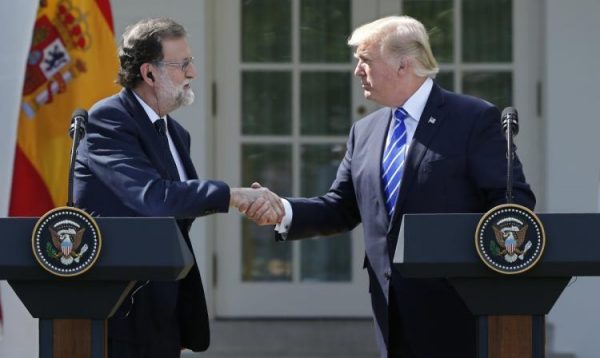After meeting with the President of the United States, Donald Trump, in the White House, the President of the Government of Spain, Mariano Rajoy, advocated boosting trade and investment between the two countries and improving police, military and intelligence coordination to counter the threat of terrorism.
At a joint press conference, Mariano Rajoy and Donald Trump agreed that bilateral relations are going through a buoyant period and expressed their interest in continuing to work as partners towards mutually beneficial ends. The economy and the main challenges on the international agenda were the main focus of the meeting between the two leaders in the Oval Office and the subsequent working lunch together with their respective delegations.
Mariano Rajoy described the meeting with Donald Trump as “highly productive”, the second such meeting he has held with a North American President in the White House following his previous meeting with Barack Obama in January 2014. “Spain and the United States are friendly and allied democracies with countless common interests and shared values. We have agreed to work together to defend them with a comprehensive and cooperative vision”, he declared.
The President of the Government pointed out that economics is one of the areas in which they can step up already “excellent” bilateral relations. Mariano Rajoy recalled that the United States is the leading destination for Spanish exports outside of the European Union, as well as the leading investor in Spain. Spanish companies, he added, “generate some 96,000 stable, high quality jobs in the United States” and “very closely follow investment opportunities” in this country.
Coordination to fight terrorism
On the issue of security and defence, Mariano Rajoy underlined the “broad agreement” between the two countries on counter-terrorism policy, “with very close cooperation at a police, military and intelligence level”. The President of the Government expressed his conviction that “there is still more to do”, particularly on coordination mechanisms between the international community in such areas as the prevention of the recruitment and financing of terrorists.
Mariano Rajoy also underlined Spain’s role as a member of the Global Coalition against terrorism and its deployment of troops in Iraq, where it is the fourth largest contributor and where it has already trained 32,000 servicemen and police officers. He also announced his intention to increase Spain’s commitment through the contribution of a new financial package to re-build Iraq.
Donald Trump, for his part, thanked Spain for its collaboration in the fight against terrorism, remarked that the two countries are allies in countering this threat and recalled the victims of the attacks committed back in August in Spain.
Crises in North Korea and Venezuela
As well as the political and economic situation in their respective countries, Mariano Rajoy and Donald Trump tackled the most important issues on the international agenda.
Firstly, the challenge of North Korea to the regime of nuclear non-proliferation constitutes “an intolerable violation of international law”, in the words of the President of the Government of Spain. Mariano Rajoy conveyed to Donald Trump the Spanish Government’s “full support” in toughening the sanctions imposed on the North Korean regime approved on 11 September by the United Nations Security Council, as well as the commitment to a “strong common position” on the part of the European Union. Donald Trump then went on to praise the position of the Government of Spain in this area.
The two leaders also analysed “the concerning totalitarian turn” taken in Venezuela and “its ever increasing poverty”, as Mariano Rajoy explained at the joint press briefing. “We have observed in this regard the need to maintain international pressure on the Government of Venezuela in order to ensure its involvement in a negotiation process aimed at facilitating a peaceful, negotiated and democratic way out of the present crisis”, he added. “The international community must not handle this with kid gloves or pull any punches” argued Mariano Rajoy.
At the start of his speech, the President of the Government of Spain expressed the solidarity of all the people of Spain with the victims of Hurricanes Harvey and Irma in several regions of the United States and Puerto Rico.
Current affairs
As regards the referendum on independence in Catalonia, which journalists enquired after at the subsequent press briefing, the President of the United States stated that “Spain is a great country and must remain united”.
The President of the Government of Spain, in response to a question on a hypothetical unilateral declaration of independence, stated that this would be “foolish”. The referendum, he added, cannot be held because there is no electoral board, nor are there people to man the polling stations, nor ballot papers, nor premises to hold them. What may happen, he suggested, is that there is “a lot of fuss and noise, but not a valid, democratic referendum with the minimum guarantees”.
In this regard, Mariano Rajoy hopes that “the step forward to a new era where the law, democracy, dialogue and common sense prevail will take place as soon as possible, before 1 October, if possible but, if not, immediately afterwards”.
As regards the delay in the presentation of the draft General State Budget for the year 2018, the President of the Government claimed that work is being done with different political forces to achieve sufficient support, as happened with this year’s Budget, and considers that there will be no problems in approving it “within a reasonable period”.






